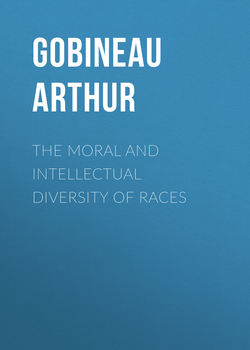The Moral and Intellectual Diversity of Races

Реклама. ООО «ЛитРес», ИНН: 7719571260.
Оглавление
Gobineau Arthur. The Moral and Intellectual Diversity of Races
EDITOR'S PREFACE
ANALYTICAL INTRODUCTION
CHAPTER I. POLITICAL CATASTROPHES
CHAPTER II. ALLEGED CAUSES OF POLITICAL CATASTROPHES EXAMINED
CHAPTER III. INFLUENCE OF GOVERNMENT UPON THE LONGEVITY OF NATIONS
CHAPTER IV. DEFINITION OF THE WORD DEGENERACY – ITS CAUSE
CHAPTER V. THE MORAL AND INTELLECTUAL DIVERSITY OF RACES IS NOT THE RESULT OF POLITICAL INSTITUTIONS
CHAPTER VI. THIS DIVERSITY IS NOT THE RESULT OF GEOGRAPHICAL SITUATION
CHAPTER VII. INFLUENCE OF CHRISTIANITY UPON MORAL AND INTELLECTUAL DIVERSITY OF RACES
INTRODUCTORY NOTE. TOCHAPTERS VIII. AND IX
CHAPTER VIII. CIVILIZATION
CHAPTER IX. ELEMENTS OF CIVILIZATION – CONTINUED
CHAPTER X. QUESTION OF UNITY OR PLURALITY OF SPECIES
CHAPTER XI. PERMANENCY OF TYPES
CHAPTER XII. CLASSIFICATION OF RACES
CHAPTER XIII. PERFECTIBILITY OF MAN
CHAPTER XIV. MUTUAL RELATIONS OF DIFFERENT MODES OF INTELLECTUAL CULTURE
CHAPTER XV. MORAL AND INTELLECTUAL CHARACTERISTICS OF THE THREE GREAT VARIETIES
APPENDIX
A
B
C
Отрывок из книги
Before departing on one's travels to a foreign country, it is well to cast a glance on the map, and if we expect to meet and examine many curiosities, a correct itinerary may not be an inconvenient travelling companion. In laying before the public the present work of Mr. Gobineau, embracing a field of inquiry so boundless and treating of subjects of such vast importance to all, it has been thought not altogether useless or inappropriate to give a rapid outline of the topics presented to the consideration of the reader – a ground-plan, as it were, of the extensive edifice he is invited to enter, so that he may afterwards examine it at leisure, and judge of the symmetry of its parts. This, though fully sensible of the inadequacy of his powers to the due execution of the task, the present writer has endeavored to do, making such comments on the way, and using such additional illustrations as the nature of the subject seemed to require.
Whether we contemplate the human family from the point of view of the naturalist or of the philosopher, we are struck with the marked dissimilarity of the various groups. The obvious physical characteristics by which we distinguish what are termed different races, are not more clearly defined than the psychical diversities observable among them. "If a person," says the learned vindicator of the unity of the human species,1 "after surveying some brilliant ceremony or court pageant in one of the splendid cities of Europe, were suddenly carried into a hamlet in Negro-land, at the hour when the sable tribes recreate themselves with dancing and music; or if he were transported to the saline plains over which bald and tawny Mongolians roam, differing but little in hue from the yellow soil of their steppes, brightened by the saffron flowers of the iris and tulip; if he were placed near the solitary dens of the Bushman, where the lean and hungry savage crouches in silence, like a beast of prey, watching with fixed eyes the birds which enter his pitfall, or greedily devouring the insects and reptiles which chance may bring within his grasp; if he were carried into the midst of an Australian forest, where the squalid companions of kangaroos may be seen crawling in procession, in imitation of quadrupeds, would the spectator of such phenomena imagine the different groups which he had surveyed to be the offspring of one family? And if he were led to adopt that opinion, how would he attempt to account for the striking diversities in their aspect and manner of existence?"
.....
Nimrod, we learn from sacred history, established the Assyrian empire. At first, this consisted of but little more than the city of Babylon, and must necessarily have contained a very homogeneous population, if from no other cause than its narrow geographical limits. At the dawn of profane history, however, we find this empire extending over boundless tracts, and uniting under one rule tribes and nations of the most dissimilar manners and tongues.
The Assyrian empire fell, and that of the Medes rose on its ruins. The Median monarchy had an humble beginning. Dejoces, says tradition, united the independent tribes of the Medes. Later, we find them ruling nations whose language they did not understand, whose manners they despised.
.....